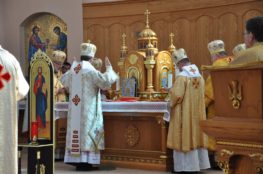It is not uncommon, either in person or via social media, for me to be asked how I went from Point A to B to C and so forth with respect to what I’ll call half-jokingly my “religious alignment.” Over the years I picked up quite a few dodgy answers, all of which are meant to indicate that I don’t feel like talking about it. I still don’t. Conversion stories are typically (though not always) a bore and the only one which people should spend any time meditating upon happened almost 2,000 years ago on a road to Damascus. The whole idea of conversion at this point in history strikes me as a bit silly, especially when it involves people going from, say, Catholicism to Orthodoxy (or vice versa) or, at the intra-ecclesial level, from “Novus Ordo Catholicism” to “Traditional Catholicism” or “New Calendar Orthodoxy” to “Old Calendar Orthodoxy,” etc. Never before have Christians had so many “options” (there’s that word again), and any “option” that is exercised typically comes from movements of the soul that have little, if anything, to do with “discovering the true Church” or “the truest part of the truest Church.” That’s not a new observation. Owen White—if I recall correctly—made it many moons ago and formulated it in terms far more powerful than any I have to offer. Not every movement of the soul is good, mind you. Some of mine certainly have not been. A lack of resolve coupled with a very personal—and highly subjective if not selfish—desire to live beyond the horizon of inter-ecclesial barking has driven more than a few of my choices over the years. A choice for Catholicism, in my estimation, should not be a choice against Orthodoxy, though anyone who has read my blogs and occasional articles over the years knows full well that I haven’t exactly lived that belief out day to day. Frankly, I struggle to live out my belief in the Credo (with or without filioque) day to day, which makes me the absolutely worst candidate to start-in about some epic ecclesiastical odyssey shot through with contradictions and missteps.
A couple of years ago my brother directed me to a book by Jaroslav Pelikan entitled Confessor Between East and West: A Portrait of Ukrainian Cardinal Josyf Slipyj. This modestly sized volume, which is regrettably out of print, helped open my eyes to the uselessness of the East/West dichotomy—a dichotomy which, even if not fully false, is so riddled with problems that it is bound to drive anyone who holds to it into placing some bad bets. Cardinal—excuse me Patriarch—Slipyj was of course a man of the geographic east who believed without reserve in the unique destiny of the Ukrainian Greek Catholic Church as both a beacon for the larger Catholic Church and a bridge to the Slavo-Byzantine patrimony held dear by the Eastern Orthodox Church. Slipyj read St. Gregory Palamas, but he also knew his St. Thomas Aquinas as well. I have to imagine that Slipyj found the “Thomists of the Strict Observance” school fairly noxious, and I would hope he’d feel the same about a certain brand of “Neo-Palamism” which has captured far too many contemporary Eastern Christian minds (Orthodox and Catholic). None of this is to say that there is an easy resolution to the genuine Thomistic disagreements with genuine Palamism. But such a resolution, if it can be attained, won’t come by each camp desperately battling to “purify” their respective tents of anything and everything that might suggest a problem with their thinker(s) of preference. I suspect the same could be said about so much East/West theological squabbling.
Having been shaped spiritually and liturgically by the Christian East at a young age, I never had much interest in Western modes of ecclesiastical being. I did, however, develop an intense interest in Ss. Augustine and Thomas, two pillars of Latin theology wrongly vilified by far too many folks who have never bothered to read them. And later on, when I improperly shed all connection to the Catholic Church, I found myself unable to fully invest in this-or-that Athonite elder or some questionable American monk whose books were alleged to hold the truth about “real Orthodoxy” in these ostensibly apocalyptic times. There was of course the great Greek and Syriac Fathers of the Church, but I quickly found the gulf between what they actually wrote and how snippets of their writings were put into theological play astonishing. A better man would have found a way to cut through the fog of false “mysticism” that shrouded the sermons of St. John Chrysostom, the high polemicism of St. Athanasius, or the orations of St. Gregory Nazianzus. I opted to stop paying attention to all of them, and my soul hasn’t been quite right since.
It is easy to believe that to be safely Catholic in this unsettling period means to brick oneself up with the Tridentine Mass and some questionable literature which romanticizes the days of Leave it to Beaver-style Catholicism. And even those who are not nearly that simplistic, but yet believe that the so-called “Novus Ordo Church” (and the “Neo-Catholics” which dominate it) have seriously imperiled both the health of the Corpus Mysticum and the ability of the Church to fully preach the Gospel, often risk turning their faith into an idol or, worse, an alienating force that pits them against their brothers and sisters in Christ. Barely a month goes by without some conservative or traditional Catholic pitching an argument in favor of clerical celibacy that isn’t grossly insulting to thousands upon thousands of married Eastern Christian clergy. On the level of liturgy it only gets worse. To read the rhetoric of some traditional Catholics, one would think the only legitimate rite in ecclesiastical history is the Roman and that the Christian East suffers from the same troubling liturgical defects as the Novus Ordo Missae. It’s only possible to stomach this form of pathological myopia for so long.
None of this is to say that I am in any way whatsoever opposed to the liturgical restoration of the Roman Rite or believe that the Roman Church should abandon the time-honored discipline of clerical celibacy. I am not even against the traditional Catholic movement per se, though I do wish it could find a way to be less hostile and more open to a much broader understanding of tradition. Much to the chagrin of some, I continue to pray for and support the good work of the Society of St. Pius X despite harboring some marginal disagreements with a few of its positions. When it comes to tradition, a friend of mine opined, the Church must breathe with both lungs. I couldn’t agree more.
As for Orthodox/Catholic relations, I remain steadfast in my belief that we need each other. As Fr. Robert Taft has pointed out consistently, neither side has clean hands. Both communions are too often beholden to the sin of pride. I know I am, just as I know that pride has frequently led me to elevate erroneous assumptions and half-cooked opinions to the level of personal dogma. That’s no way to live, and for those of you who have already come to realize as much, I can only hope that God continues to bless you with that insight and pray that it lays down deep roots in me “before I go hence and be no more.”



